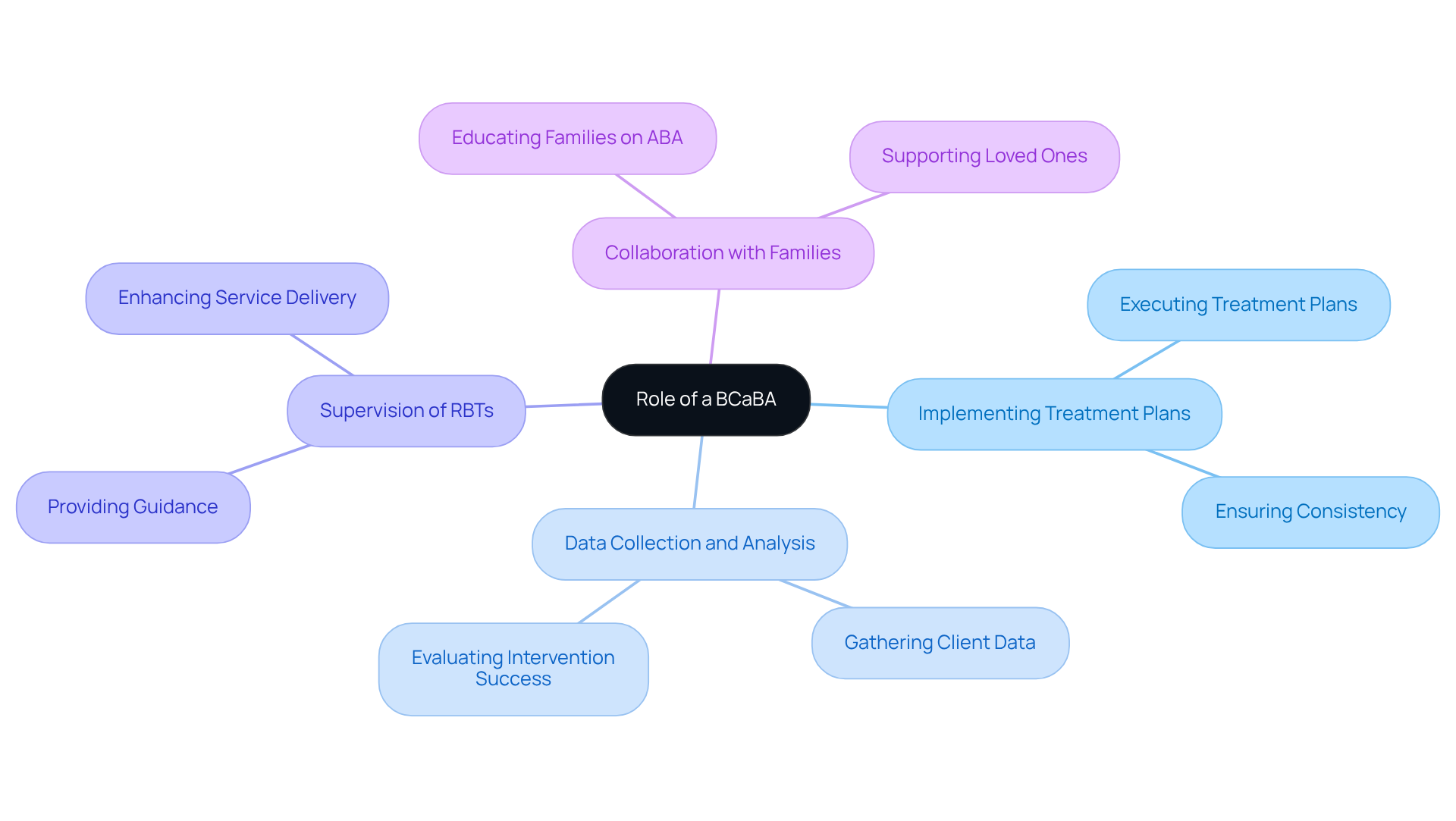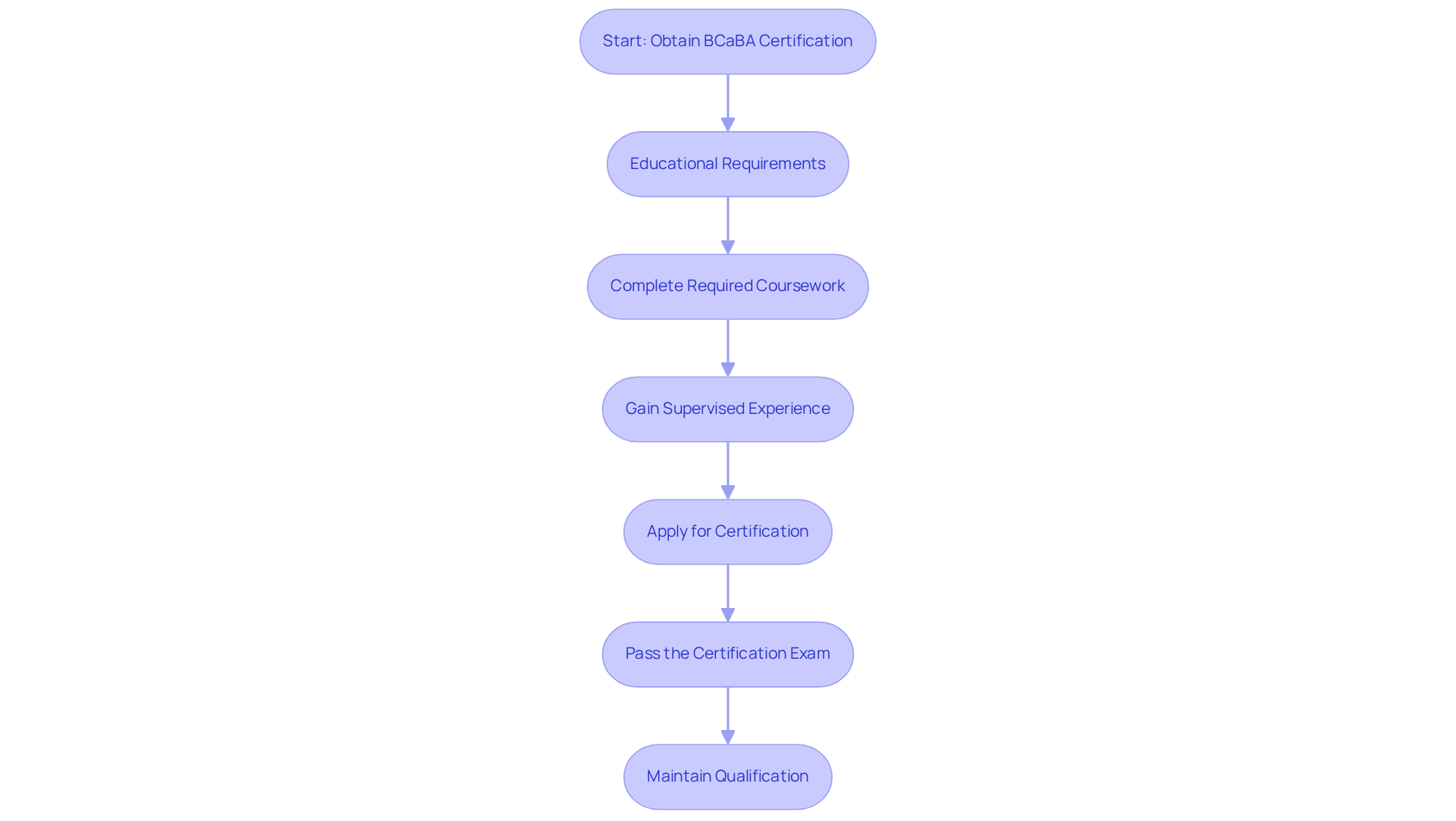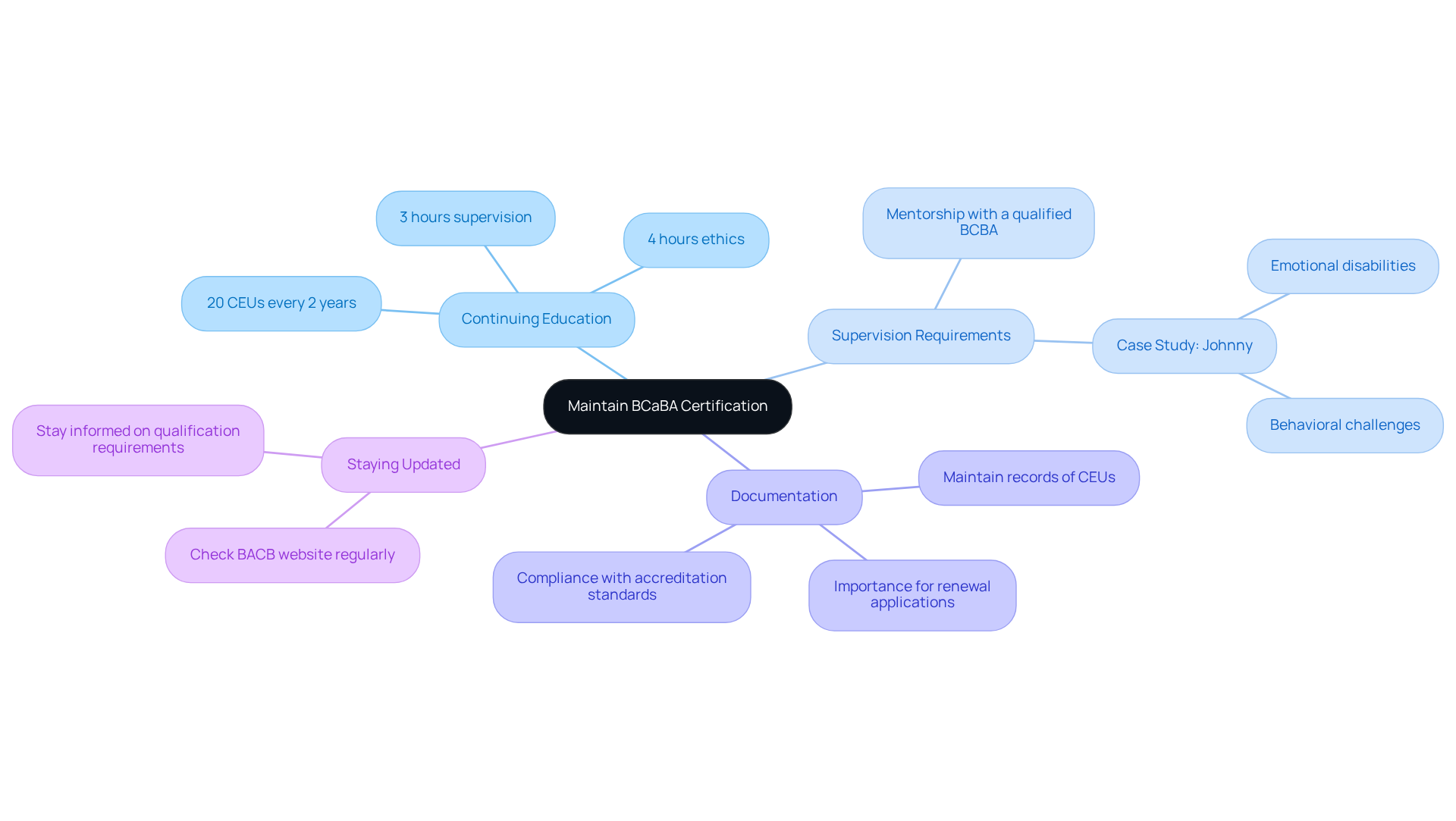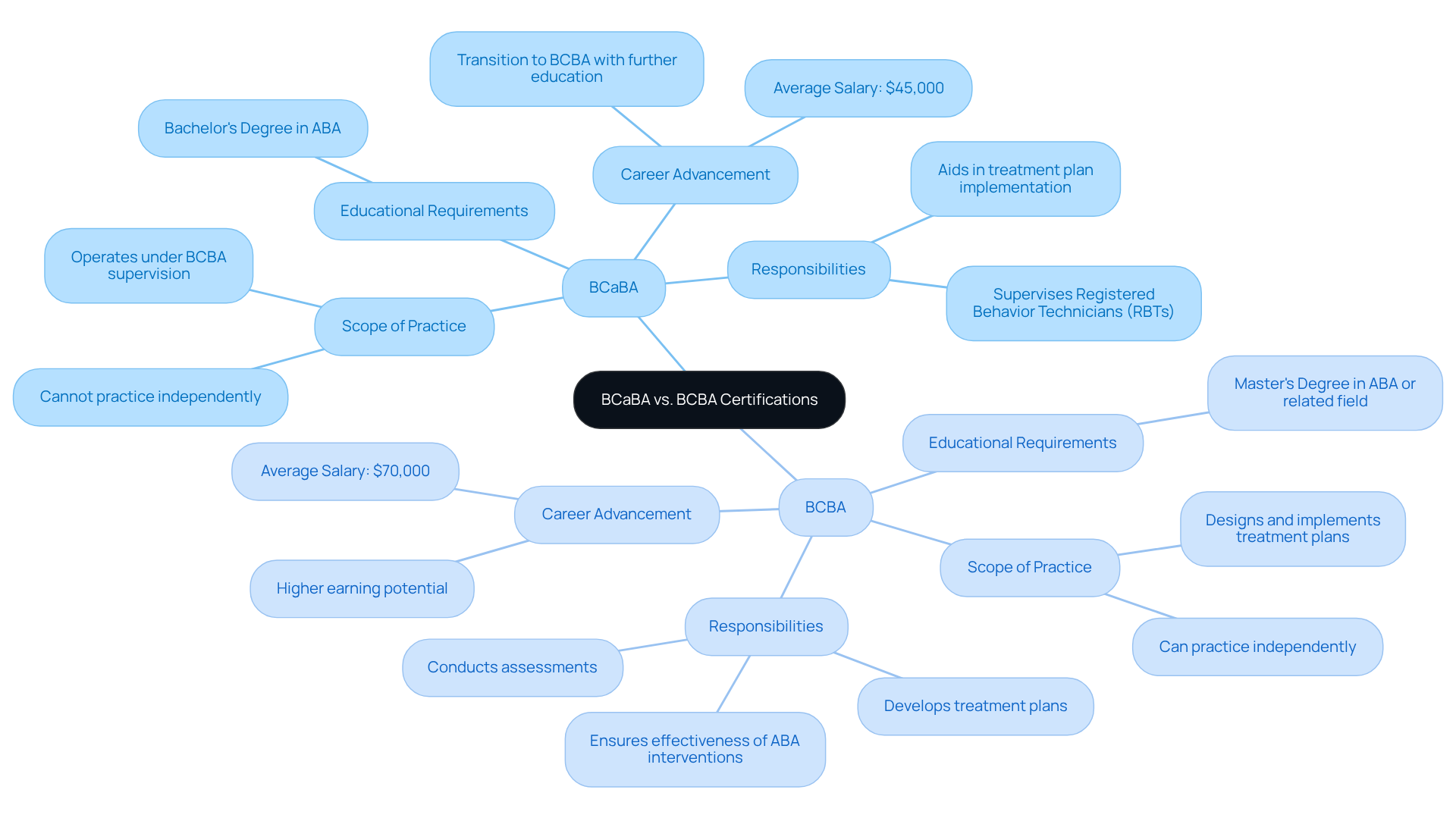September 17, 2025

To become a Board Certified Assistant Behavior Analyst (BCaBA), one must:
This certification is increasingly in demand, reflecting the growing need for qualified professionals in the field of Applied Behavior Analysis. The importance of ongoing education and supervision cannot be overstated, as these elements are crucial for maintaining certification and fostering professional growth. This article outlines these steps in detail, emphasizing the benefits of continuous learning and the role of supervision in enhancing expertise.
Considering the challenges in hiring qualified candidates, have you thought about how Hire ABA can streamline your recruitment process? By understanding these requirements and leveraging reliable platforms, you can ensure your team is equipped with the best talent in the field.
The demand for Board Certified Behavior Analysts (BCBAs) is soaring, making the role of a Board Certified Assistant Behavior Analyst (BCaBA) increasingly vital in the field of Applied Behavior Analysis (ABA). This article serves as your comprehensive guide to navigating the essential steps for obtaining BCaBA certification, encompassing everything from educational prerequisites to credential maintenance. As the ABA field rapidly evolves, understanding the distinct differences between BCaBA and BCBA roles becomes crucial. Are you prepared to ensure your success in this rewarding profession? Let us guide you on the right path.
A Board Certified Assistant Behavior Analyst (BCaBA) is essential in the field of Applied Behavior Analysis (ABA). Operating under the supervision of a Board Certified Behavior Analyst (BCBA), BCaBAs are tasked with implementing behavior intervention plans, conducting assessments, and collecting data on client progress. Their key responsibilities include:
Understanding these roles is vital for aspiring behavior analysts who are learning how to become a BCaBA and aiming to align their educational and professional objectives. Furthermore, Hire ABA offers tailored , directly benefiting BCaBAs by connecting them with positions that suit their skills, preferences, and desired locations. This comprehensive support can significantly elevate their career trajectory within the ABA field. Are you ready to explore how Hire ABA can optimize your hiring process and enhance your career opportunities?

To become a BCaBA, follow these essential steps:
By adhering to these steps carefully, you will understand how to become a BCaBA and successfully achieve your credentials as a behavior analyst.

To maintain your BCaBA certification effectively, it is crucial to adhere to the following guidelines:
By actively engaging in ongoing education and maintaining detailed records, you can understand how to become a BCaBA while ensuring your credential remains valid and that you are equipped with the latest skills and knowledge in ABA.

The BCaBA and BCBA certifications fulfill distinct roles within the realm of Applied Behavior Analysis (ABA), each characterized by specific educational requirements and responsibilities.
To begin with, the educational requirements differ significantly. A candidate aspiring to become a BCaBA must possess a bachelor’s degree, whereas BCBA certification necessitates a master’s degree in behavior analysis or a related field. Moreover, BCBA candidates are required to complete approximately 2,000 hours of supervised fieldwork, a critical component of the certification process. This foundational difference establishes the varying levels of expertise and responsibility in practice.
In terms of scope of practice, individuals designated as Behavior Analysts in Training operate under the supervision of BCBAs and are prohibited from practicing independently. Conversely, BCBAs possess the authority to design and implement treatment plans autonomously, reflecting their advanced training and expertise.
When it comes to responsibilities, the primary function of a BCaBA involves aiding in the implementation of treatment plans and supervising . In contrast, BCBAs shoulder broader responsibilities, which include conducting assessments, developing treatment plans, and ensuring the overall effectiveness of ABA interventions.
Career advancement is another crucial consideration. Many professionals initiate their careers as behavior analysts and subsequently pursue further education to transition into BCBA roles. This progression not only enhances their autonomy in practice but also significantly boosts their earning potential. BCBAs earn an average salary of around $70,000 annually, compared to approximately $45,000 for their counterparts. Additionally, the demand for BCaBAs has surged dramatically, with a reported 1,098% increase between 2010 and 2018, underscoring the growing recognition of this role. The job outlook for ABA therapists is also promising, with a projected growth rate exceeding 20% by 2029.
Understanding these distinctions is vital for aspiring behavior analysts who are learning how to become a BCaBA as they navigate their career paths and make informed decisions regarding their educational and professional trajectories.

Becoming a Board Certified Assistant Behavior Analyst (BCaBA) is an essential milestone for those looking to make a substantial impact in the field of Applied Behavior Analysis (ABA). This journey requires a deep understanding of the critical roles and responsibilities of a BCaBA, adherence to a structured certification process, and a commitment to ongoing professional development. By mastering these components, individuals can establish themselves as indispensable contributors to effective behavioral interventions.
The process to obtain BCaBA certification involves several key steps:
It is crucial to maintain certification through continuing education and supervision, ensuring that BCaBAs stay informed and competent in their practice. Furthermore, understanding the distinctions between BCaBA and BCBA certifications reveals unique responsibilities and career advancement opportunities within the field.
Ultimately, the path to becoming a BCaBA not only enhances individual career prospects but also supports the overarching mission of improving lives through effective behavior analysis. Aspiring behavior analysts are urged to embrace this journey and leverage available resources, such as ongoing education and professional networks, to excel in their roles and leave a lasting impact in the ABA community.
What is the role of a BCaBA?
A Board Certified Assistant Behavior Analyst (BCaBA) plays a crucial role in Applied Behavior Analysis (ABA) by implementing behavior intervention plans, conducting assessments, and collecting data on client progress under the supervision of a Board Certified Behavior Analyst (BCBA).
What are the key responsibilities of a BCaBA?
The key responsibilities of a BCaBA include implementing treatment plans, collecting and analyzing data on client behaviors, supervising Registered Behavior Technicians (RBTs), and collaborating with families to educate them on ABA principles and strategies.
How does a BCaBA support the implementation of treatment plans?
BCaBAs are responsible for executing treatment plans devised by BCBAs, ensuring that interventions are applied consistently and effectively.
In what ways do BCaBAs collect and analyze data?
BCaBAs meticulously gather data on client behaviors and progress, which is essential for evaluating the success of interventions.
What is the BCaBA's role in supervising RBTs?
BCaBAs may oversee Registered Behavior Technicians (RBTs) by providing guidance and support to enhance the delivery of ABA services.
How do BCaBAs collaborate with families?
BCaBAs frequently engage with families to educate them on ABA principles and strategies, helping them better support their loved ones.
What resources does Hire ABA offer for BCaBAs?
Hire ABA provides tailored resume assessments and advanced job fit scoring, helping BCaBAs connect with positions that match their skills, preferences, and desired locations, thereby enhancing their career opportunities in the ABA field.
Our expert recruitment strategies and AI-driven sourcing ensure that you receive top-notch candidates quickly, without compromising on quality. Whether you’re looking for BCBAs, Clinical Directors, or RBTs, we’ve got you covered.